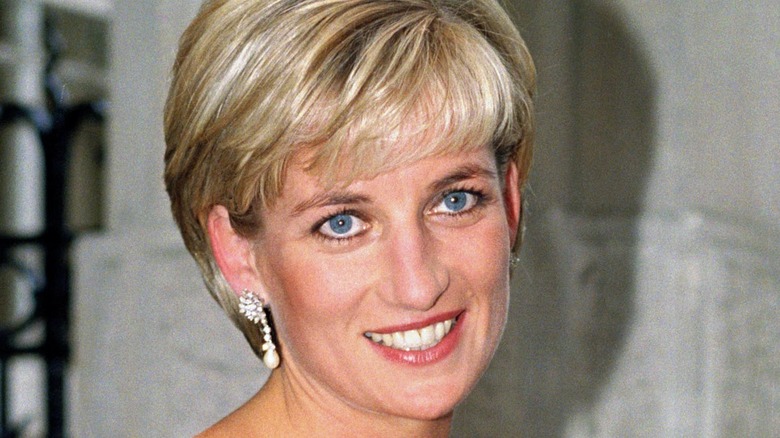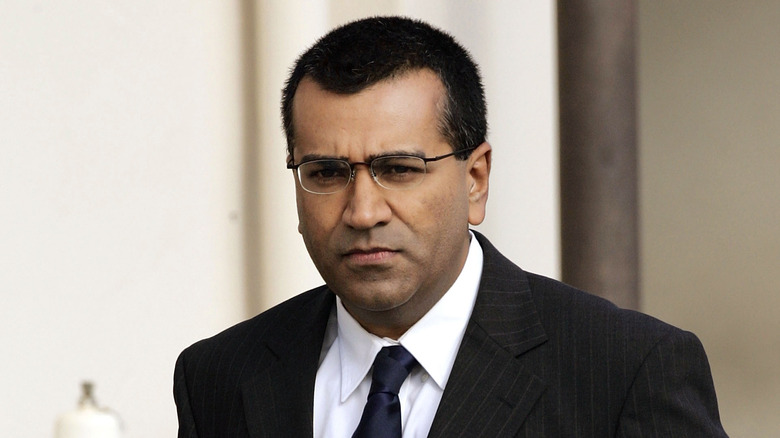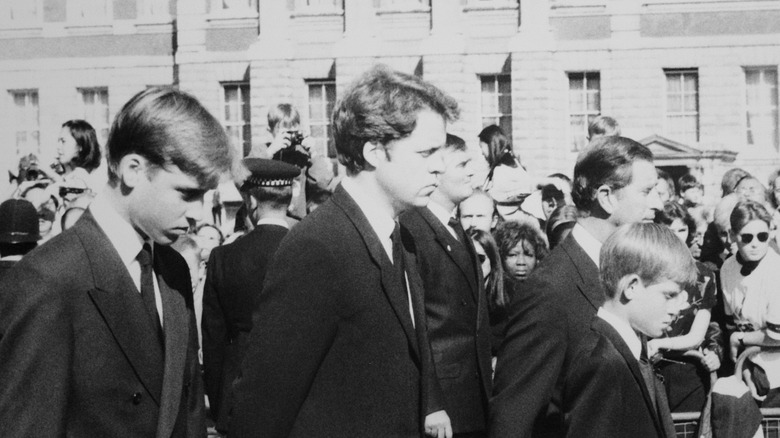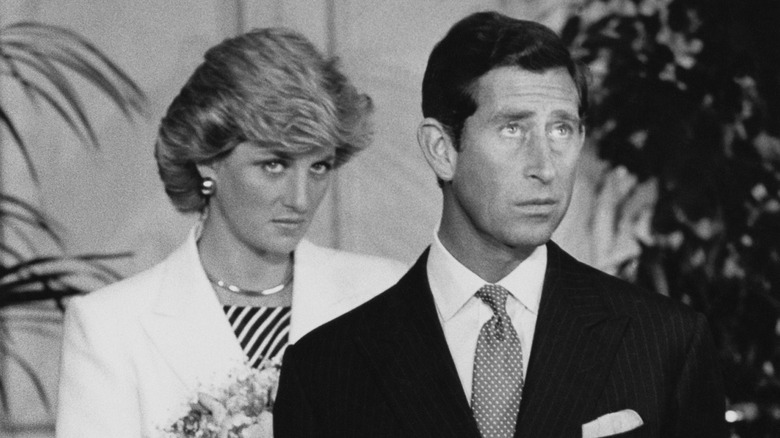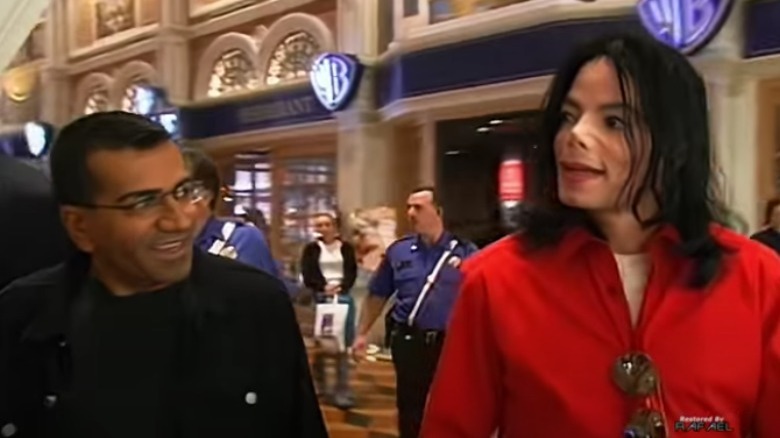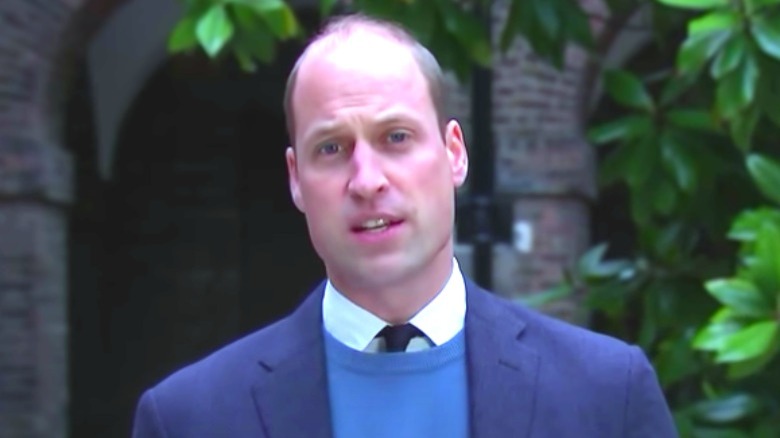The Untold Truth Of Prince Diana's Surprising Panorama Interview
It was a career-making interview when Diana, Princess of Wales, openly discussed what had been going on behind the scenes during her marriage to the future King of England with British journalist Martin Bashir for the BBC-produced "Panorama" series in 1995. But the fact that Bashir, a then lesser-known reporter, landed one of the most sought-after interviews in the world raised questions.
At the time, Diana was separated and in divorce proceedings with her husband of 15 years, the heir to the English throne, Prince Charles. Though she had been hounded by media for all of those years, she did not often sit down for tell-all interviews. Bashir's interview with Princess Diana was watched by 23 million people in the U.K. alone when it aired on November 20, 1995. Many more watched worldwide.
According to the Report of the Dyson Investigation by a former British justice of the Supreme Court, The Right Honourable Lord Dyson, the BBC did an internal investigation in 1996 into "the propriety of the methods (Bashir) used to secure the interview." The network discovered that Bashir had used dubious means to meet Diana, which were "unwise and incautious" but "played no part in Mr. Bashir's obtaining the interview with Princess Diana." Dyson's findings would differ.
Bashir falsified documents to gain Diana's trust
After the internal BBC investigation, the situation quieted down, but according to the Dyson Report, Diana's brother, Earl Spencer, always felt something was amiss in the way that Bashir went about getting to Diana, especially because Spencer himself was involved. The way it went was that Bashir reached out to Spencer's secretary to try to initiate a casual conversation with Spencer, saying he wanted to share some information with him. The two men had never met.
A few days later, on August 31, 1995, Bashir met with Spencer. Spencer and members of the royal family were being targeted by the tabloids and people working in his household were selling information to the media, said Bashir. Per the Dyson Report, there was a lot of subsequent back-and-forth over these allegations between Spencer and Bashir. Spencer went so far as to call the BBC to vet the young journalist. In the end, the Dyson report found that Bashir showed Earl Spencer fake bank statements that made it look like payments were being made to Princess Diana and Prince Charles' private secretaries from media companies in order to obtain dirt on the divorcing royal couple.
Because Spencer believed Bashir. Spencer arranged a meeting with his sister, Diana, so Bashir could share the information with her. Years later, Spencer would come to "draw a line" from his meeting with Bashir to Diana's tragic and untimely death in a car crash in Paris on August 31, 1997.
Diana's brother said Bashir's deception damaged Diana's ability to trust
In a clip of a BBC interview with Earl Spencer posted on Deadline, Spencer talks about how Bashir's false allegations led to an erosion of trust for Princess Diana at the same time she was leaving the protection of the royal family. She was led to believe that people close to her were selling information about her. "The irony is that I met Martin Bashir on the 31st of August 1995 because exactly two years later she died, and I do draw a line between the two events," Spencer told the BBC.
"It's quite clear from the introduction that I sat in on on the 19th September 1995 that everyone was going to be made untrustworthy, and I think that Diana did lose trust in really key people," he said. "This is a young woman in her mid-30s who has lived this extraordinarily turbulent and difficult time in the public eye. She didn't know who to trust and in the end, when she died two years later, she was without any form of real protection."
Diana was very candid with Bashir in the Panorama inverview
One person Diana did seem to trust, though, was Bashir. In the transcript of the 1995 interview, posted by the BBC, she opened up to him, and the world, about her feelings and struggles upon becoming a member of the royal family, the pressure she felt from the ever-present media attention, and her rocky marriage, in which she admitted, "Well, there were three of us in this marriage, so it was a bit crowded," referring to Prince Charles' mistress (now his wife) ,Camilla Parker Bowles.
Diana shared with Bashir that she suffered postpartum depression and that she was bulimic for "a number of years," as a coping mechanism for her extreme unhappiness which stemmed from her lack of feeling worthy. She also said, "It was a symptom of what was going on in my marriage."
She said, "The cause was the situation where my husband and I had to keep everything together because we didn't want to disappoint the public, and yet obviously there was a lot of anxiety going on within our four walls."
Through all of the pressures of being married to a future king, Diana's love for and devotion to her children and her humanitarian work still shone through the interview. It was as if the world got a sneak peak into the real goings-on behind the speculation and tabloid fodder.
Martin Bashir's career took off after he interviewed Princess Diana
The explosive interview garnered Bashir a Bafta TV award and the Journalist of the Year Award from the Royal Television Society in 1995, according to the BBC. Not long after that, the existence of the fake documents came to light, but the BBC stood by its reporter, even claiming that Diana had written the network a letter saying "she was more than happy with the way the interview was arranged and conducted."
In the subsequent years, Bashir went on to interview several more people who were huge names in the news of the day, and he even got Michael Jackson to admit he shared his bed with kids (per the BBC). Bashir worked in the U.S. for ABC News and MSNBC where he made some blunders, including sexist and unprofessional remarks. In 2016 he went back to working for the BBC as their religious affairs correspondent and then editor.
Then in 2020, while two British networks were working on documentaries for the 25th anniversary of the Princess Diana interview, the issue of the bank statement forgeries was revisited with the BBC, appointing Lord Dyson to do the investigation. His report was released on May 20, 2021, and it held not only Bashir accountable for being "deceitful," but also the BBC, writing, "without justification, the BBC fell short of the high standards of integrity and transparency which are its hallmark."
Bashir and the BBC apologized publicly and the network wrote to both Prince William and Prince Harry, the BBC reported.
Prince William said the BBC's failures contributed significantly to Diana's fear, paranoia, and isolation
In a two-minute-long statement posted by the Royal Family Channel via YouTube in regards to the Dyson report, Prince William said that the deceitful manner in which the "interview was obtained substantially influenced what my mother said," which the prince described as a "major contribution to making my parents relationship worse ..." He also calls out the BBC for their lackluster investigation and for hiding their discovery of the forged bank statements, as Princess Diana was greatly affected by believing that those in her inner circle could not be trusted.
William said, "the BBC's failures contributed significantly to her fear, paranoia, and isolation that I remember from those final years with her ... she's failed not just by a rogue reporter, but by leaders of the BBC who looked away rather than asking the tough questions."
Bashir resigned from the BBC in May before the Dyson Report was released, citing ongoing health issues, including heart surgery and ongoing difficulties from Covid-19, which he had in early 2021, The New York Times reported.
